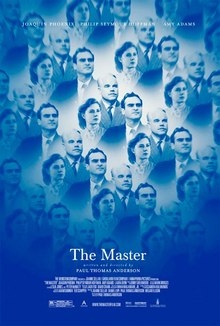
THE MASTER.

Five years after the brutal “There Will Be Blood”, Paul Thomas Anderson comes back with “The Master.” You've heard it's about a cult called The Cause. But no. It's about a million things, and yet, nothing ; about a man finding his way, about a man lost, about how all of us want to be lied to and made to feel better, about control and release, and about all of us and none of us. Anderson is at the same point now, having peaked with the brief apex between ability and vision, where from here, unless he holds his nerve, he becomes a craftsman and not an creator. But here, his tale is smaller, more personal. Less about the politics of control, but more about how we are controlled, sometimes by ourselves, and how we don't even know it, controlled into being unaware of how controlled we are. The Master serves many purposes, but it is, at heart a mans battle between himself and many other selves – including himself - for the freedom to be himself.
There comes a time where we know just enough to be the best we can be, but not too much to stop being this. This is the brief window Anderson inhabits now. It may be closing. Only time will tell.
Whilst immaculately constructed, and dealing with some themes both complex and emotionally difficult, the first thing I thought during the whole film was “First World Problems”. Some people grasp with the meaning of who they are ; others are grasping with having shoes or enough food to eat. In this film Freddie Quell and Lawrence Dodd are two men who have a bizarre relationship : neither is particularly likable : Freddie is at best, an incompetent, passive/aggressive, human form of an angry dog with added booze. Dodd is a stumbling semi-mystic bullshitter who fools the gullible with a fiction that falls apart under examination. It's the story of a lost soul looking for peace and almost finding it. To an extent it is the tale of a failed love affair, but instead of something as prosaic as a person, the love is for an idea. The love is for an answer. The answer is always unknowable. The film is about the search for the Missing, the Unknowable, and not knowing even when it is found, if it is ever found.
It opens and ends in the same place : sex. With the lost looking to be found. With the start, and the end of something. On the way though, Phoenix and Hoffman do the most strange case of Actor-Battle I have ever seen. Chewing each others scenery like starving wolves, yet, also not acting, but being deeply disturbed, broken people somehow stumbling with fractured souls through this life. Some make it work. Some don't. And yet, in the midst of this, events rise and fall. Anderson weaves plot strands, and yet they drop and are never mentioned again : a court case is reduced to one line. The consequences passively overlooked as if of no import. It feels as there are scenes missing, or scenes added that barely move the plot forward.
This is not Andersons masterpiece. Nor is it his Zardoz. It is a moving work of art by a gun on fire, confident and assured, dealing with perhaps the smallest and biggest of issues at the same time, and moving to a conclusion frame by frame. The idea here is that the director has automatically earned respect – not that it is earnt on a film-by-film basis. That the past reputation retrospectively/proactively taints any film with the shadow of genius. Would this film have been made had it come from an unknown? Probably not. Would it be hailed? Very probably so. And there is the quandry : are we masters, or are we the mastered? Do we know the power we give away, and that we never use? Do we care? Too busy living to be alive.
